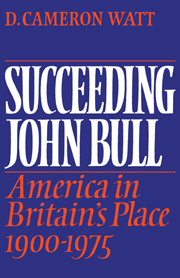Book contents
- Frontmatter
- Contents
- Preface
- Acknowledgments
- 1 Introduction
- 2 1900–1919
- 3 1919–1934
- 4 1934–1940
- 5 1940–1947
- 6 1947–1963
- 7 1963–1975
- 8 Some tentative conclusions
- ADDITIONAL ESSAYS: THREE CASE STUDIES
- 9 Presidential power and European cabinets in the conduct of international relations and diplomacy; a contrast
- 10 Britain, America and Indo-China, 1942–1945
- 11 American anti-colonialist policies and the end of the European colonial empires, 1941–1962
- Bibliographical note
- Select bibliography
- Index
11 - American anti-colonialist policies and the end of the European colonial empires, 1941–1962
Published online by Cambridge University Press: 05 November 2011
- Frontmatter
- Contents
- Preface
- Acknowledgments
- 1 Introduction
- 2 1900–1919
- 3 1919–1934
- 4 1934–1940
- 5 1940–1947
- 6 1947–1963
- 7 1963–1975
- 8 Some tentative conclusions
- ADDITIONAL ESSAYS: THREE CASE STUDIES
- 9 Presidential power and European cabinets in the conduct of international relations and diplomacy; a contrast
- 10 Britain, America and Indo-China, 1942–1945
- 11 American anti-colonialist policies and the end of the European colonial empires, 1941–1962
- Bibliographical note
- Select bibliography
- Index
Summary
The New Left school of historians in the United States, who have concerned themselves with the origins of the war in Vietnam in particular, and of the Cold War in general, have come perilously close to enunciating a variant of the myth of the expulsion from the Garden of Eden. According to them America once lived a pure anti-colonialist anti-imperialist life. America did not dabble in imperialism. It had no truck with Europe. In the words of one of their earlier practitioners, Lloyd C. Gardner:
Political leadership in the anti-Axis alliance suddenly brought the United States into new and sometimes uncomfortably close relations with the colonial empires of its allies …
America's historic disassociation from European rulers, and its own revolutionary heritage, had created reservoirs of good-will in Asia and Africa. Native leaders and potential revolutionaries from these places had studied with admiration the thought and deeds of the first American revolutionaries, Tom Paine and George Washington, along with those of the next century, Henry Thoreau and Abraham Lincoln.
The image of America which they carried back to their fellows was generally happy, one on which Americans liked to pride themselves. How crushing then that so many Asians and Africans held up to America after World War II a new image in which Uncle Sam had become corroded and evil …
- Type
- Chapter
- Information
- Succeeding John BullAmerica in Britain's Place 1900-1975, pp. 220 - 252Publisher: Cambridge University PressPrint publication year: 1984



